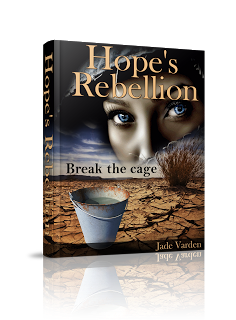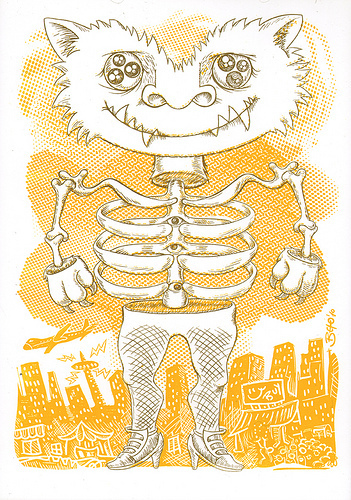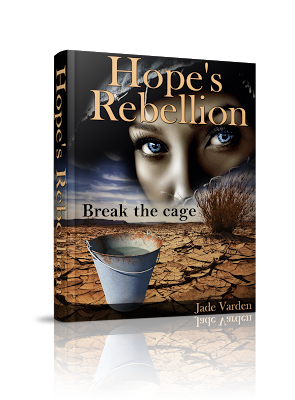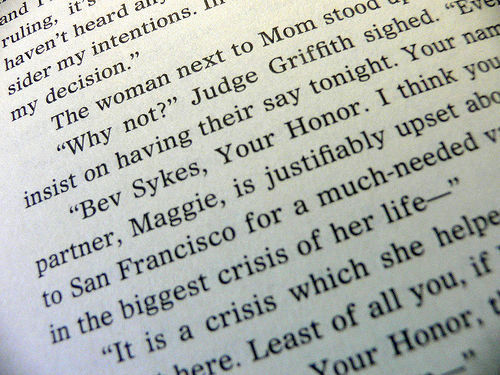Jade Varden's Blog, page 51
November 2, 2013
Hope's Rebellion: Sneak Peek
This is a first look at my newest book, Hope's Rebellion. Enjoy!
 Hope's RebellionComing November 2013
Hope's RebellionComing November 2013
“Do it again!” Maura screamed. “One, two, three.”All at once, twenty little bodies hit the stones beneath them. The sun was starting to sink, and they’d been doing drills for hours. “If an Argot passes you or enters into the same room as you, it’s your duty to react appropriately. To do otherwise could cost you your life. Keep your eyes on the ground!” She shouted. “Remember to touch your forehead to the floor in front of you, and then you’ll never forget.”“Do you think she listens to herself when she speaks?” whispered Preeka.“Shhh,” Yala warned, behind her.“She never listens to anybody when they speak,” Drexi replied. “She only likes the sound of her own voice. The words don’t matter.”“Maybe you think you know more than me about proper behavior, Drexi?” Maura was suddenly standing in front of her. Drexi saw her own black hair reflected in the shiny tips of Maura’s boots. “Up!”Drexi stood.“Down!”Drexi bent at the waist, pointing her eyes downward.“All the way!” Maura screamed. “We’ve been doing this drill all day.”“But you’re not an Argot,” Drexi answered innocently, keeping her eyes trained on Maura’s boots. “I thought the drill was proper positioning. This is the proper position for you.” Snickers rippled through the girls, and when Drexi chanced a glance upward she saw that Maura’s face had turned a deep, terrifying shade of red. “Go stand on the peg!” She screeched. “Up, the rest of you. I want you to see what happens when you let your smart mouths run away with you. If I were Drexi’s mistress, I could have her beaten or even put her out of my home. She’s lucky to only stand on the peg.”Drexi almost snapped that Maura wouldn’t really know if it was better or not, since she never stood her big body on the peg, but there wasn’t any point in making her punishment worse. So she bit her tongue as she walked to the center of the quad, toward a narrow post that rose six feet above the ground. She climbed the ladder and established her balance before kicking it away, the way she was supposed to.The peg measured about two inches in circumference, too narrow for both feet. Drexi would have to balance herself, and try not to fall down to the hard stones below. If she did, she would only have to climb back up again.And she would know. Drexi had been on the peg more than anyone else in Camp Five…ever. After the other girls all filed passed her into the cafeteria for dinner, Preeka got her wish. It started to rain for the first time that winter. The deluge lasted well into the night. Maura finally let Drexi step down from her spot ten minutes before lights out. When she couldn’t be roused the next day, she was taken to the infirmary. It took four days before Drexi became conscious again, she was so ill from standing in the cold rain. When she was able to return to the dorm six days later, Maura gave her kitchen duty for two straight weeks.
 Hope's RebellionComing November 2013
Hope's RebellionComing November 2013 “Do it again!” Maura screamed. “One, two, three.”All at once, twenty little bodies hit the stones beneath them. The sun was starting to sink, and they’d been doing drills for hours. “If an Argot passes you or enters into the same room as you, it’s your duty to react appropriately. To do otherwise could cost you your life. Keep your eyes on the ground!” She shouted. “Remember to touch your forehead to the floor in front of you, and then you’ll never forget.”“Do you think she listens to herself when she speaks?” whispered Preeka.“Shhh,” Yala warned, behind her.“She never listens to anybody when they speak,” Drexi replied. “She only likes the sound of her own voice. The words don’t matter.”“Maybe you think you know more than me about proper behavior, Drexi?” Maura was suddenly standing in front of her. Drexi saw her own black hair reflected in the shiny tips of Maura’s boots. “Up!”Drexi stood.“Down!”Drexi bent at the waist, pointing her eyes downward.“All the way!” Maura screamed. “We’ve been doing this drill all day.”“But you’re not an Argot,” Drexi answered innocently, keeping her eyes trained on Maura’s boots. “I thought the drill was proper positioning. This is the proper position for you.” Snickers rippled through the girls, and when Drexi chanced a glance upward she saw that Maura’s face had turned a deep, terrifying shade of red. “Go stand on the peg!” She screeched. “Up, the rest of you. I want you to see what happens when you let your smart mouths run away with you. If I were Drexi’s mistress, I could have her beaten or even put her out of my home. She’s lucky to only stand on the peg.”Drexi almost snapped that Maura wouldn’t really know if it was better or not, since she never stood her big body on the peg, but there wasn’t any point in making her punishment worse. So she bit her tongue as she walked to the center of the quad, toward a narrow post that rose six feet above the ground. She climbed the ladder and established her balance before kicking it away, the way she was supposed to.The peg measured about two inches in circumference, too narrow for both feet. Drexi would have to balance herself, and try not to fall down to the hard stones below. If she did, she would only have to climb back up again.And she would know. Drexi had been on the peg more than anyone else in Camp Five…ever. After the other girls all filed passed her into the cafeteria for dinner, Preeka got her wish. It started to rain for the first time that winter. The deluge lasted well into the night. Maura finally let Drexi step down from her spot ten minutes before lights out. When she couldn’t be roused the next day, she was taken to the infirmary. It took four days before Drexi became conscious again, she was so ill from standing in the cold rain. When she was able to return to the dorm six days later, Maura gave her kitchen duty for two straight weeks.
Published on November 02, 2013 05:30
October 31, 2013
Writing 101: Carving Up Your Story
Being a writer is pretty brutal. Even the good reviews might contain comments that feel like arrows piercing your innards. That's why, as the author, you've got to be the toughest person in the room when it comes to your own story. Before you present it, you've got to cut it into usable slices your audience can digest. Just how adept are you at carving up your story?

Knife Skills
I'm referring to editing techniques, of course, but I'm doing it in a colorful way (I hope). You have to be a real killer when it comes to your own story lines and plot. Too many sub-plots muck up a story, and over-long descriptions get skipped.
Length is a factor in each and every single book, and it's a problem that only goes one of two ways: the book is too short, or too long. Rarely is the length ever "just right," because if a story is really good then readers want more of it. But books can be too long as well. In fact, this is a very common characteristic among new authors who have written only one or just a few books.
Sometimes, that book your writing isn't an epic story...it's an epic length. It's never a good idea to throw a bunch of extra stuff into a story. Take care with any scenes that take readers away from the main plot. I'm not a huge fan of flashbacks, diary entries or stories-within-stories when it comes to the body of the book itself. When used sparingly they can be powerful, but if any of these elements are over-done your book could easily feel like it's dragging.
You have to be ready to carve up that book of yours, and cut it down to just the main plot. Sometimes, this is an incredibly painful experience. I would know, because I have a few manuscripts that deserve a brutal chopping and I'm fully capable of avoiding them indefinitely. But if you really want to get that book out there for the public, you have to go through that process.
Cut out any scenes that don't drive the main plot forward, or reveal some integral piece of information about a character. Every single sentence of your book should meet some specific goal that you have for the story -- it paints the picture, it moves the action, it reveals a character's inner motivations. Every word has to do something, and every scene has to serve a specific function. If you can identify scenes and paragraphs and sentences that don't do this, cut them.
Be brutal with your book and yourself. At times editing big chunks of text will feel a little bit like taking a knife to your own heart, but remember that you're serving a greater good. You're creating a better story that's easier to read. So cut out those flowery passages, the windy monologues, the pages of descriptions of oak trees that I don't really need to read, and carve up your story. Isn't today the perfect day to inflict a little damage?

Knife Skills
I'm referring to editing techniques, of course, but I'm doing it in a colorful way (I hope). You have to be a real killer when it comes to your own story lines and plot. Too many sub-plots muck up a story, and over-long descriptions get skipped.
Length is a factor in each and every single book, and it's a problem that only goes one of two ways: the book is too short, or too long. Rarely is the length ever "just right," because if a story is really good then readers want more of it. But books can be too long as well. In fact, this is a very common characteristic among new authors who have written only one or just a few books.
Sometimes, that book your writing isn't an epic story...it's an epic length. It's never a good idea to throw a bunch of extra stuff into a story. Take care with any scenes that take readers away from the main plot. I'm not a huge fan of flashbacks, diary entries or stories-within-stories when it comes to the body of the book itself. When used sparingly they can be powerful, but if any of these elements are over-done your book could easily feel like it's dragging.
You have to be ready to carve up that book of yours, and cut it down to just the main plot. Sometimes, this is an incredibly painful experience. I would know, because I have a few manuscripts that deserve a brutal chopping and I'm fully capable of avoiding them indefinitely. But if you really want to get that book out there for the public, you have to go through that process.
Cut out any scenes that don't drive the main plot forward, or reveal some integral piece of information about a character. Every single sentence of your book should meet some specific goal that you have for the story -- it paints the picture, it moves the action, it reveals a character's inner motivations. Every word has to do something, and every scene has to serve a specific function. If you can identify scenes and paragraphs and sentences that don't do this, cut them.
Be brutal with your book and yourself. At times editing big chunks of text will feel a little bit like taking a knife to your own heart, but remember that you're serving a greater good. You're creating a better story that's easier to read. So cut out those flowery passages, the windy monologues, the pages of descriptions of oak trees that I don't really need to read, and carve up your story. Isn't today the perfect day to inflict a little damage?
Published on October 31, 2013 05:30
October 30, 2013
Writing 101: How to Isolate Yourself
Writers have to imagine entire worlds, people and situations inside their heads. Then they have to take those thoughts and put them on the page. It's a personal process, and because of that you have to know how to isolate yourself.

Tuning Out
Can you write in a noisy room filled with people? I can...because I can isolate. Clearly it's not an ideal writing situation, but I'm guessing that you don't live in a large mansion with lots and lots of rooms. I'm guessing you live in a normal-sized home, and that other people are sometimes around you.
And when that's the case, you're going to need to know how to isolate yourself...even when you can't lock yourself in the attic and write, a la Josephine March (Little Women reference).
Pick a spot, any spot: Choose a location in your home that's your "spot." I sit on one end of my couch with my laptop. I'm used to writing here when it's quiet, and that makes it easier to write when the room is crowded. You're already in the mindset that you're going to write from this spot if you make a habit of working in the same place. Tell the others: Make sure that everyone in your household knows that this is your writing spot. When you have the keyboard under your fingers and that weird look on your face, it means that you're writing -- and that means they have to leave you alone unless it's an emergency. Family members of writers may have to hear this many, many times before they start to get it. Focus: Tune out. When you're writing, focus just on the screen. Get used to writing with background noise by turning on the TV or listening to music while you're working. Start out at a low volume and gradually increase the sound to get yourself used to it. Focus is like a muscle; you have to work it out and get it strong before you can tune out the entire world to write.Don't Be Extreme
There are going to be many times when you have to isolate yourself in order to write. You will have to tune out the world, focus on your words and ignore everybody else's. But don't go to extremes. Writing by its very nature is lonely. Isolate too much and you might drive yourself a little crazy.
Remember to spend time with other people and spend time getting out of the house. You need to interact with others, but when it's time to write it's time to stop socializing.

Tuning Out
Can you write in a noisy room filled with people? I can...because I can isolate. Clearly it's not an ideal writing situation, but I'm guessing that you don't live in a large mansion with lots and lots of rooms. I'm guessing you live in a normal-sized home, and that other people are sometimes around you.
And when that's the case, you're going to need to know how to isolate yourself...even when you can't lock yourself in the attic and write, a la Josephine March (Little Women reference).
Pick a spot, any spot: Choose a location in your home that's your "spot." I sit on one end of my couch with my laptop. I'm used to writing here when it's quiet, and that makes it easier to write when the room is crowded. You're already in the mindset that you're going to write from this spot if you make a habit of working in the same place. Tell the others: Make sure that everyone in your household knows that this is your writing spot. When you have the keyboard under your fingers and that weird look on your face, it means that you're writing -- and that means they have to leave you alone unless it's an emergency. Family members of writers may have to hear this many, many times before they start to get it. Focus: Tune out. When you're writing, focus just on the screen. Get used to writing with background noise by turning on the TV or listening to music while you're working. Start out at a low volume and gradually increase the sound to get yourself used to it. Focus is like a muscle; you have to work it out and get it strong before you can tune out the entire world to write.Don't Be Extreme
There are going to be many times when you have to isolate yourself in order to write. You will have to tune out the world, focus on your words and ignore everybody else's. But don't go to extremes. Writing by its very nature is lonely. Isolate too much and you might drive yourself a little crazy.
Remember to spend time with other people and spend time getting out of the house. You need to interact with others, but when it's time to write it's time to stop socializing.
Published on October 30, 2013 05:30
October 29, 2013
Writing 101: How to Create a Monster
Halloween is coming, and all the spooky stuff is coming out. Want to write a scary book? Then you might just need to know how to create a monster. It's not so easy to do when all you've got is your words.

It's Alive!
Some of the greatest monsters ever created come not from Hollywood, but from the page. When Mary Shelley wrote Frankenstein and Bram Stoker penned Dracula, movies didn't exist. They had to use words to create terrifying creatures bent on destruction. And if they can create such iconic monsters so many centuries ago, you can definitely create a decently scary one right now. But even the best of writers use certain literary tricks to inspire fear.
The unknown: This trick works so well, they even use it in the movies. Some of the scariest stuff is the stuff we can't really see. Think of Jason Voorhies hiding behind his hockey mask, or Jaws swimming around somewhere below the waves. Because we can't see it, we're terrified. The grotesque: If you want to create a monster, make it a really gross one. When things are oozing and features are out of place and fingernails are extra-long, it's pretty darned frightening. Pull out your ickiest adjectives, and go to work. Just remember when you create a monster that you need to visualize it very clearly. The normal: Some monsters don't look like monsters, and this is what makes them frightening. By some standards, serial killers like Ted Bundy and John Wayne Gacy are monsters. Yet they look like ordinary guys, rather clean-cut and plain. The idea that your average-looking next-door-neighbor might be a horrible killer should scare the verbs right out of you. Use it to fashion a chilling monster on the page.The supernatural: If your monster is somehow otherworldly, this can be pretty frightening stuff. What if it can fly? Maybe it can't die. How does anyone fight such a beast! See, I'm already scared. The natural: Your monster doesn't have to be a humanoid creature. Sometimes, Mother Nature herself is the villain. A weather phenomenon, maybe a terrible disease -- these things can also be monsters in scary books. And the main rule of creating a monster on the page? Make sure it frightens you. If you aren't afraid of your monster, readers won't be, either.

It's Alive!
Some of the greatest monsters ever created come not from Hollywood, but from the page. When Mary Shelley wrote Frankenstein and Bram Stoker penned Dracula, movies didn't exist. They had to use words to create terrifying creatures bent on destruction. And if they can create such iconic monsters so many centuries ago, you can definitely create a decently scary one right now. But even the best of writers use certain literary tricks to inspire fear.
The unknown: This trick works so well, they even use it in the movies. Some of the scariest stuff is the stuff we can't really see. Think of Jason Voorhies hiding behind his hockey mask, or Jaws swimming around somewhere below the waves. Because we can't see it, we're terrified. The grotesque: If you want to create a monster, make it a really gross one. When things are oozing and features are out of place and fingernails are extra-long, it's pretty darned frightening. Pull out your ickiest adjectives, and go to work. Just remember when you create a monster that you need to visualize it very clearly. The normal: Some monsters don't look like monsters, and this is what makes them frightening. By some standards, serial killers like Ted Bundy and John Wayne Gacy are monsters. Yet they look like ordinary guys, rather clean-cut and plain. The idea that your average-looking next-door-neighbor might be a horrible killer should scare the verbs right out of you. Use it to fashion a chilling monster on the page.The supernatural: If your monster is somehow otherworldly, this can be pretty frightening stuff. What if it can fly? Maybe it can't die. How does anyone fight such a beast! See, I'm already scared. The natural: Your monster doesn't have to be a humanoid creature. Sometimes, Mother Nature herself is the villain. A weather phenomenon, maybe a terrible disease -- these things can also be monsters in scary books. And the main rule of creating a monster on the page? Make sure it frightens you. If you aren't afraid of your monster, readers won't be, either.
Published on October 29, 2013 05:30
October 28, 2013
Writing 101: Sticking With It
What the real secret of being successful as an indie author? Sticking with it. The key ingredient to success at anything is perserverence. You have to learn how to stick with it...even when the entire universe is conspiring against you in every possible way.

Stubborn
Success and stubbornness go hand-in-hand. People who are successful heard the word "no" hundreds of times before getting the "yes" that mattered. If you want to make it as an indie author, you've got to stick with it. Cement yourself to a spot, hitch your wagon to a goal, and don't waver.
If you want to get more readers and sell more books, you have to work at it. Readers for indie authors often come slowly, one at a time. You've got to use your stubbornness in order keep getting them. Keep maintaining your blog. Post fresh content, keep building up that archive of posts, and slowly regular followers will trickle in. Keep working on your Twitter and social media accounts. Keep following people, keep posting updates and keep staying active to continue gaining new readers.
You may have to work at it for years and years before you ever see real results, but that's the nature of being an indie author. You didn't give up on getting your books published, so give up on getting them read. Keep working at it and you will build up a fan base, over time. You will sell books to people who want to read them.
But while you're building your base, don't forget to work on your craft. Continue building yourself as an author, and make each new book better than the last.

Stubborn
Success and stubbornness go hand-in-hand. People who are successful heard the word "no" hundreds of times before getting the "yes" that mattered. If you want to make it as an indie author, you've got to stick with it. Cement yourself to a spot, hitch your wagon to a goal, and don't waver.
If you want to get more readers and sell more books, you have to work at it. Readers for indie authors often come slowly, one at a time. You've got to use your stubbornness in order keep getting them. Keep maintaining your blog. Post fresh content, keep building up that archive of posts, and slowly regular followers will trickle in. Keep working on your Twitter and social media accounts. Keep following people, keep posting updates and keep staying active to continue gaining new readers.
You may have to work at it for years and years before you ever see real results, but that's the nature of being an indie author. You didn't give up on getting your books published, so give up on getting them read. Keep working at it and you will build up a fan base, over time. You will sell books to people who want to read them.
But while you're building your base, don't forget to work on your craft. Continue building yourself as an author, and make each new book better than the last.
Published on October 28, 2013 05:30
October 26, 2013
Cover Reveal: Hope's Rebellion
I'm pleased to announce that I'm finally ready to reveal the cover for my new book, Hope's Rebellion!!!

Their friendship will test the fabric of tradition, duty and destiny...
There are only two seasons in Godenor: summer and winter. Weather brings the only surprises to a society where everything is planned, and everyone's status is determined at birth...by the color of their hair.
Rinna has the right hair, Drexi the wrong, and Prelly is almost too ordinary -- in every way but one. Small mistakes bring them together, creating ripples in a pond that knows nothing but serenity. If they reach their goals, they can't help but shatter the world they know.
Love of any kind, even the bond of friendship, isn't allowed in their world...but then, the heart can't always follow orders.
COMING IN NOVEMBER!!!

Their friendship will test the fabric of tradition, duty and destiny...
There are only two seasons in Godenor: summer and winter. Weather brings the only surprises to a society where everything is planned, and everyone's status is determined at birth...by the color of their hair.
Rinna has the right hair, Drexi the wrong, and Prelly is almost too ordinary -- in every way but one. Small mistakes bring them together, creating ripples in a pond that knows nothing but serenity. If they reach their goals, they can't help but shatter the world they know.
Love of any kind, even the bond of friendship, isn't allowed in their world...but then, the heart can't always follow orders.
COMING IN NOVEMBER!!!
Published on October 26, 2013 05:30
October 24, 2013
Writing 101: Being Brave
There is something essential in writing that lots of indie authors simply don't have, and it forces them to take a huge leap of faith every time they put another book out there. Without a literary agent or a publishing house, indie authors lack the one thing they really and truly desire: validation. All writers are secretly afraid that they're no good. When you choose the path of going it alone, that fear walks with you.

Being brave is the ingredient that all indies have to have. I know, because I've been completely cowardly for many, many weeks now. And as my Amazon author page will prove, I haven't published anything all year long.
Did You Hear That?
I wrote, recently, about the way I've been obsessing over my latest book. I've had all sorts of reasons for not finishing it. First, I was moving. That's hectic, that's an adjustment, so I didn't really get any work done for months. Next, I was swamped with work. Somebody's got to pay for the new house, after all. Then there were some health problems, and stuff I needed to bake, and that movie I love came to Netflix...
I realized, at last, that my problem isn't with that one scene. My new book is outside my usual subgenre, and it's got me sweating bullets. I've been finding reasons to drag it out and excuses for putting it off. I've been re-thinking what I've already written and re-reading so much I'm having dreams about the story. And it's because I'm afraid.
Every author has to be brave, but the indie author has to be even braver. Self-published authors don't have literary experts or even business professionals combing over their pages and picking apart their plots. Indie authors essentially stand alone, and that's a really cold place to be even if you aren't trying something new. It takes bravery to publish. And if you can't find it, focus on this: the alternative is that no one will read your words at all.

Being brave is the ingredient that all indies have to have. I know, because I've been completely cowardly for many, many weeks now. And as my Amazon author page will prove, I haven't published anything all year long.
Did You Hear That?
I wrote, recently, about the way I've been obsessing over my latest book. I've had all sorts of reasons for not finishing it. First, I was moving. That's hectic, that's an adjustment, so I didn't really get any work done for months. Next, I was swamped with work. Somebody's got to pay for the new house, after all. Then there were some health problems, and stuff I needed to bake, and that movie I love came to Netflix...
I realized, at last, that my problem isn't with that one scene. My new book is outside my usual subgenre, and it's got me sweating bullets. I've been finding reasons to drag it out and excuses for putting it off. I've been re-thinking what I've already written and re-reading so much I'm having dreams about the story. And it's because I'm afraid.
Every author has to be brave, but the indie author has to be even braver. Self-published authors don't have literary experts or even business professionals combing over their pages and picking apart their plots. Indie authors essentially stand alone, and that's a really cold place to be even if you aren't trying something new. It takes bravery to publish. And if you can't find it, focus on this: the alternative is that no one will read your words at all.
Published on October 24, 2013 05:30
October 23, 2013
Writing 101: Need a Little Extra Money?
If you're an indie author and you self-publish books all on your own and you're living in this economy, chances are good that you could do with a little extra money. And believe me, I'm not going to give it to you. But I can tell you where to get a few extra bucks. Only be warned: I do mean that literally.

Does a Little Go a Long Way?
Do you have some tidbit to share about crafting, gardening, fashion, some other area of your interest? Do you know recipe secrets, or all sorts of stuff about homebrewing? You can turn your skills into articles, and you can turn those into a little bit of extra cash.
If you're not an expert and you have no idea how to write an article (which isn't so different from writing a blog post, honestly), you can always share your creative writing. Short stories and poems may also net you a few bucks.
The site is Yahoo Voices, and they'll pay you for your content. The site accepts all sorts of different writing, including original poems and items that you've already published online. Through up-front payments, performance payments or both, it's possible to earn a little bit of money for your writing. Your work will also be published on the Yahoo Voices site, stuff that you can share with your fans and family members.
But when I say a "few dollars," I'm not being cute. Yahoo Voices doesn't dole out large amounts of money. You have to create a lot of content in order to earn regular income, and you can't expect to quit your "day job" based upon those revenue earnings. But you can earn some money, get your name out there...and possibly do something with all that writing you've got stored up on your hard drive.

Does a Little Go a Long Way?
Do you have some tidbit to share about crafting, gardening, fashion, some other area of your interest? Do you know recipe secrets, or all sorts of stuff about homebrewing? You can turn your skills into articles, and you can turn those into a little bit of extra cash.
If you're not an expert and you have no idea how to write an article (which isn't so different from writing a blog post, honestly), you can always share your creative writing. Short stories and poems may also net you a few bucks.
The site is Yahoo Voices, and they'll pay you for your content. The site accepts all sorts of different writing, including original poems and items that you've already published online. Through up-front payments, performance payments or both, it's possible to earn a little bit of money for your writing. Your work will also be published on the Yahoo Voices site, stuff that you can share with your fans and family members.
But when I say a "few dollars," I'm not being cute. Yahoo Voices doesn't dole out large amounts of money. You have to create a lot of content in order to earn regular income, and you can't expect to quit your "day job" based upon those revenue earnings. But you can earn some money, get your name out there...and possibly do something with all that writing you've got stored up on your hard drive.
Published on October 23, 2013 05:30
October 22, 2013
Writing 101: Block vs. Indents Isn't Even a Debate
As some of you know, I read a lot of author forums. Lately I'm seeing a topic that greatly disturbs me at the deepest levels. The debate between block paragraph versus indented paragraphs continues to be an issue among indies, and this is distressing. Because this isn't even an issue, or a debate. There's one way to format a book...my way.

Visual Appeal
Have you ever picked up a fiction novel and found block paragraphs waiting for you inside, with blank lines between each one? If the answer is yes, was this book self-published or otherwise released by an indie? Because this answer is yes as well, and I know it to be true.
Paragraph indents are an industry standard across the board when it comes to fiction stories. This means that the first line of every paragraph is indented, usually five spaces, to leave a small gap between the line and the left-side page margin. There is no extra space between paragraphs in this format.
Block indenting has become popular thanks to the Internet. Even I use it for my blog, because when you read online it's easier to read text in big chunks. But when you read a book, you want those words to flow. You want to read the story as a cohesive whole, not take it in one small piece at a time. Proper formatting is essential if you want your book to look and read professionally. It's necessary if you want your words to flow.
So I'm officially declaring that the debate is over. When it comes to other types of books, I'm willing to keep an open mind. But when it comes to fiction stories, you need to use indents.

Visual Appeal
Have you ever picked up a fiction novel and found block paragraphs waiting for you inside, with blank lines between each one? If the answer is yes, was this book self-published or otherwise released by an indie? Because this answer is yes as well, and I know it to be true.
Paragraph indents are an industry standard across the board when it comes to fiction stories. This means that the first line of every paragraph is indented, usually five spaces, to leave a small gap between the line and the left-side page margin. There is no extra space between paragraphs in this format.
Block indenting has become popular thanks to the Internet. Even I use it for my blog, because when you read online it's easier to read text in big chunks. But when you read a book, you want those words to flow. You want to read the story as a cohesive whole, not take it in one small piece at a time. Proper formatting is essential if you want your book to look and read professionally. It's necessary if you want your words to flow.
So I'm officially declaring that the debate is over. When it comes to other types of books, I'm willing to keep an open mind. But when it comes to fiction stories, you need to use indents.
Published on October 22, 2013 05:30
October 21, 2013
Writing 101: Becoming Evil
Authors have to be a little bit viscous (or downright evil) in order to create exciting books. What would Harry Potter be without Voldemort, who senselessly kills? Where would we be without Dracula, an immortal murderer? Books often have villainous characters. But here's the secret that authors know: we're the real villains. You're the one who has to learn how to become evil. How else are you going to torture your characters?

I'll Give You Something to Cry About...
Look, bad things happen to everybody. Have you ever fallen off a bike? Broken a bone? Been involved in a car accident? ...Known someone who has died? Real life is filled with tragedies big and small, and that's why all the best books must have the same.
If you're writing properly, your characters should be going through a fair bit of hell before they reach their happy or tragic conclusions. Characters should not be perfect, and neither should their lives.
In other words, you have to become the villain. You have to be willing to put your characters through terrible situations, and you have to watch them suffer. Becoming evil is something that every author has to learn how to do. You can't write about a murderer without thinking about what it's like to be a murderer, right? So tap into your inner evilness. It's perfectly safe to do that...just as long as you keep your dark side confined to the page.

I'll Give You Something to Cry About...
Look, bad things happen to everybody. Have you ever fallen off a bike? Broken a bone? Been involved in a car accident? ...Known someone who has died? Real life is filled with tragedies big and small, and that's why all the best books must have the same.
If you're writing properly, your characters should be going through a fair bit of hell before they reach their happy or tragic conclusions. Characters should not be perfect, and neither should their lives.
In other words, you have to become the villain. You have to be willing to put your characters through terrible situations, and you have to watch them suffer. Becoming evil is something that every author has to learn how to do. You can't write about a murderer without thinking about what it's like to be a murderer, right? So tap into your inner evilness. It's perfectly safe to do that...just as long as you keep your dark side confined to the page.
Published on October 21, 2013 05:30



